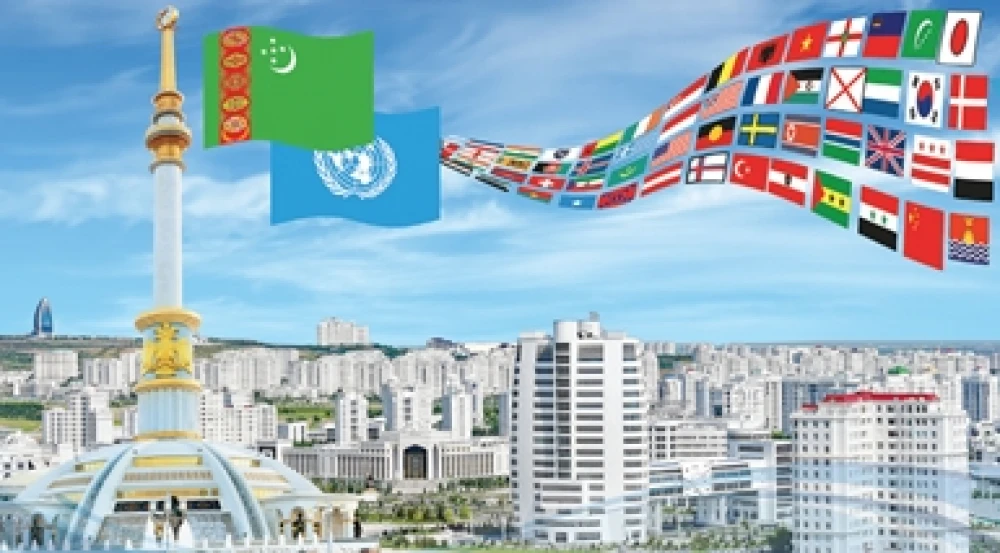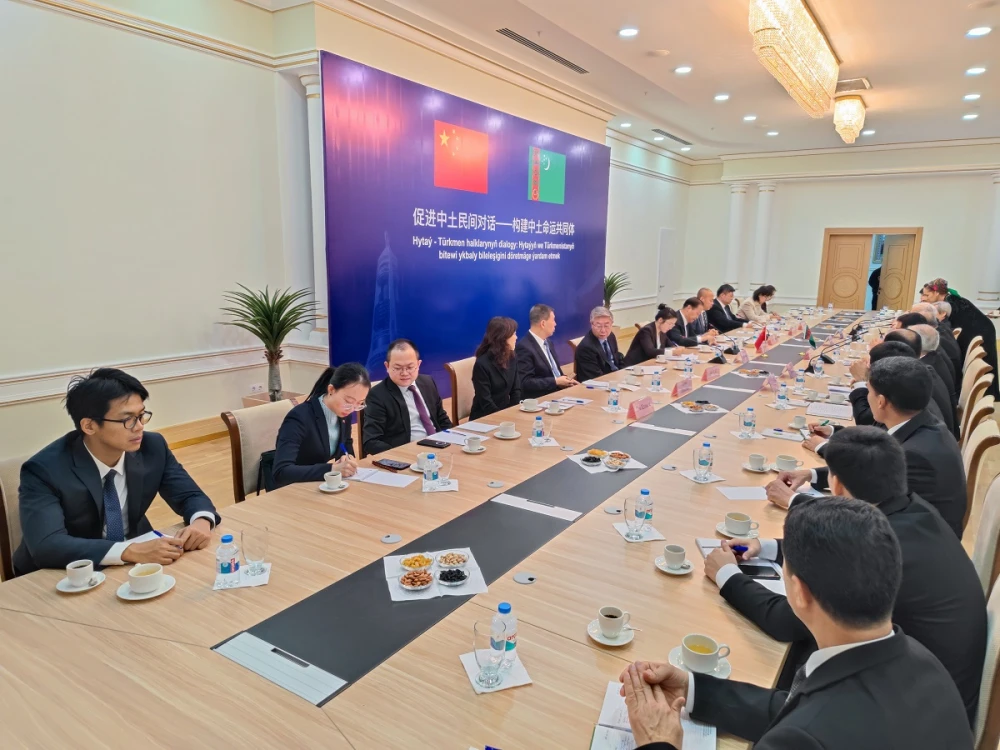
1611
The Institution of Neutrality: Lessons from History in the Context of the New Century
Dr.Begench Karayev, Senior Lecturer, Institute of International relations of MFA Turkmenistan
I would like to explain some aspects of the neutrality foreign policy of Turkmenistan, in the context of peace and regional security regarding our region and Greater Central Asia. It is known that when studying the phenomenon of neutrality from a scientific point of view, we know its use as a political or diplomatic tool since ancient times. For example, certain agreements on neutrality were made between the great Alexander of Macedonia and the Massageteans [massajitians]. A Treaty of neutrality was concluded between Parthia and Rome [pa:fia and röum]. There are a lot of examples of the application of neutrality both in the history of the East and in the history of the West, especially in Europe. But, in the modern sense, neutrality attracted attention during the last century or so. The well-known history of the Great Game ended with the de facto recognition of Afghanistan as a neutral country. But the essence of Kipling’s famous phrase about East and West remained unchanged. It is known that one of the triggers in the outbreak of the First World War was the violation of the neutrality of Belgium on August 4, 1914. At the beginning of the Second World War, more precisely on September 4, 1939, the United States and Japan declared their neutrality in the Second World War. In April 1941, a five-year Neutrality Pact between the USSR and Japan was signed. A number of countries in the Middle East declared their neutrality at that time. During the years of both the Second World War and the Cold War, many countries of the world declared their neutrality. The phenomenon of Turkmenistan’s neutrality is different in that it was declared after the end of the Cold War, which meant, as it were, the beginning of “global peace”. Moreover, the international legal status of the permanent neutrality of Turkmenistan was recognized by the adoption of a special resolution of the UN General Assembly, which was unprecedented in the history of international relations. At that time, many wondered why a young country needs neutrality at the very beginning of “the era of global peace”? Today, more than three decades later, this question is asked in a more specific context – how far-sighted was Turkmenistan in declaring its neutrality from the first days of independence? Here it is necessary to remember some lessons of history. The end of the Cold War was hailed in the international community as the beginning of global peace. In particular, in the scientific community, the conceptual idea of the “End of history” was met almost with a standing ovation. More precisely, more than 30 years ago, on February 1, 1992, the Presidents of Russia and the United States signed the Camp David Declaration, which formally and legally ended the Cold War period. The text of the Camp David Declaration was indeed historical. The first and most important point read: “Russia and the United States do not consider each other as potential adversaries. From now on, the hallmark of their relationship will be friendship and partnership based on mutual trust.” At that moment, no one remembered the famous phrase of the French Marshal Ferdinand Foch, Commander-in-Chief of the Allied Forces, at the conclusion of the Treaty of Versailles on June 28, 1919, which officially ended the First World War. (Marshal Foch declared: “This is not peace, this is a truce for 20 years!”). The global events of the new 21st century, especially in the second decade, have confirmed the relevance of the institution of neutrality. It is no coincidence, therefore, that in 2015 the UN General Assembly adopted the second resolution on the permanent neutrality of Turkmenistan. This document confirms the importance of not only “Turkmen neutrality,” it is also the evidence that neutrality as a policy and diplomatic tool has become even more relevant for maintaining peace and security in the new conditions – in the context of global polarization. It must be admitted that in the current difficult conditions, all mechanisms for maintaining peace and security, including the institution of neutrality, are being tested by history itself. It is noteworthy that at the same time, the idea of Turkmenistan on the priority of neutrality finds support in the UN, including from the leading world powers. As is known, in order to facilitate regular dialog internationally, in particular within the United Nations, on practical use of peacekeeping potential of states building their policies on the principles of neutrality, Turkmenistan initiated the establishment of the Group of Friends of Neutrality for Peace, Security and Sustainable Development in September 2020. Using the positive experience of currently functioning multilateral Groups on various issues of international agenda, abovementioned Group of Friends acts as an informal association to strengthen political dialogue within the United Nations and to develop previously unexplored tools for strengthening peace and security. Today more than 20 countries have joined this Group, in particular the co-sponsors of the United Nations General Assembly resolutions “Permanent Neutrality of Turkmenistan” of 1995 and 2015, “International Day of Neutrality” of February 2, 2017, “The Role and Importance of a Policy of Neutrality in Maintaining and Strengthening International Peace, Security and Sustainable Development” of December 7, 2020. The final Declaration of the high-level meeting of the Group of Friends of Neutrality for Peace, Security and Sustainable Development, held in Ashgabat on December 10, 2022, was published on March 1, 2023 as a document of the 77th session of the UN General Assembly. Active support for the idea of creating a Group of Friends of Neutrality in the UN is not accidental. Neutrality today is becoming a foreign policy line of conduct regarding today’s serious conflicts. In this regard, I would like to quote a phrase in the January issue of The Economist magazine by a well-known American economist, Jeffrey Sachs, an adviser to three UN secretaries-general and president of the UN Sustainable Development Solutions Network, who emphasized that: “The peacemaking role of major neutral countries could be decisive…. These neutral countries are major players in the global economy. According to the IMF’S estimates of GDP at purchasing-power parity, the combined output of Argentina, Brazil, China, India, Indonesia and South Africa ($51.7trn, or almost 32% of world output) in 2022 was larger than that of the G7 nations”. Here I would also like to recall the words of the distinguished Ambassador John MacGregor, Head of the OSCE Center in Ashgabat, during the previous course of lectures in November 2022 for students of the Institute of International Relations of the Ministry of Foreign Affairs of Turkmenistan and the International University for the Humanities and Development. Addressing the students, Head of the OSCE Center emphasized that “Turkmenistan’s permanent neutrality is consistent with the comprehensive approach to security, which is the foundational core of the Organization for Security and Co-operation in Europe.” I think that these words are very thoughtful and confirmed by the experience of more than 30 years of cooperation between Turkmenistan and the OSCE. The actualization of the neutrality of Turkmenistan as an effective instrument of geopolitics is especially visible in the regional context, when Central Asia is rapidly drawn into the orbit of world processes. At the same time, it should be noted that the countries of the Central Asian region are becoming not just participants, but also active subjects in the formation of new formats of dialogue. One of them is the Consultative Meeting of the heads of state of Central Asian countries, which demonstrate that interstate political dialogue has reached a qualitatively new level, setting the tone for the dynamic development of relations in the spirit of genuine good neighborliness and alliance. The changing security paradigm has set a prominent part of the agenda of the Fourth Consultative Meeting of the heads of state of Central Asian countries was held in Cholpon-Ata, Issyk-Kul region of Kyrgyzstan on 21 July 2022. As noted during the speeches, “the international situation does not inspire optimism, both from the point of view of global security and the world economy…Today, the Central Asian States face traditional challenges and security threats, and their new hybrid forms have appeared”. President of Turkmenistan Serdar Berdimuhamedov noted, that: “Security challenges urge to set up a strong and long-term regional security system. In the year that has passed since the third Consultative Meeting of the Heads of Central Asian States in the city of Turkmenbashi, significant transformations have taken place in the world, new realities and challenges have emerged. They did not bypass our region. With all the urgency, the key issue arose – ensuring security. Unfortunately, we cannot yet say that peace in the wide Eurasian space is unshakable, and stability has acquired an irreversible character. There are threats, and they manifest themselves in different forms and under various circumstances”. Head of Turkmenistan highlighted the main ones: • First, these are attempts to destabilize the internal political situation in the states of our region. • Second, these are attempts to infiltrate extremist and radical elements into Central Asia, terrorist danger, drug trafficking, and other types of illegal activities. • Third, the possible negative impact on the situation in Central Asia of the consequences of military-political conflicts taking place in relative proximity to the borders of our region. • Fourth, it is the illegal use of information technologies, the imposition from the outside of ideas and attitudes that run counter to the historical traditions of the peoples of Central Asia, basic values and age-old foundations of live. President of Turkmenistan particularly emphasized that the most important part of cooperation in the field of regional security is still joint work in the Afghan track. In particular, he noted that: “As neighboring States of Afghanistan, which have special historical ties with it, we need to continue to step up efforts aimed at stabilizing the situation in this country, creating conditions for achieving national accord through peaceful dialogue, contributing to international efforts to combat terrorism, and providing economic and humanitarian assistance to the people of Afghanistan”. Our esteemed President in this regard noted, that: “We reasonably consider Turkmenistan’s neutrality to be an important factor in conflict prevention. I would like to note that the constructive role of Turkmen neutrality has been recognized and confirmed by two resolutions of the UN General Assembly adopted with the co-authorship of all the Central Asian states. We propose to use this factor in the further practical implementation by our countries of their international agenda to strengthen universal peace and stability”. Thus, Turkmenistan demonstrates that the process of peacebuilding in Afghanistan is based on the unity of three key areas: political, economic and social-humanitarian. Today Turkmenistan takes part in the UNs 77th session as Vice-Chairman of the UN General Assembly. Maintenance and strengthening of universal peace, stability and security are acquiring special importance in modern conditions and continues to remain the main issue on the international agenda for the foreseeable future. It is primarily due to the transformation of traditional threats in the conditions of the global pandemic and the need to rapidly adapt the entire existing architecture of security to the new combinations of challenges. [This is not part of the conference material. It is a separate article by Dr. Karayev.] /// nCa, 17 May 2023


